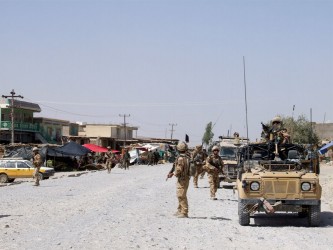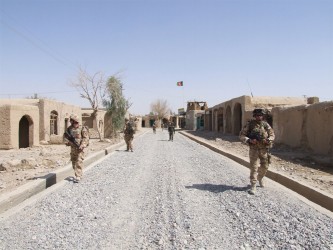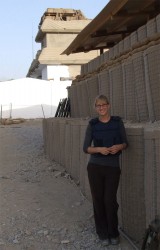I was in the air somewhere above Helmand the other day, flying in a Sea King helicopter, trying to do my commute-time reading, but a long way from the squeeze of the Tube. A moment later, I was interrupted from my daydreams when the helicopter banked and swerved. Fear flashed through me as the rear gunner rushed to my side of the helicopter to see what was happening down below, but there was nothing to be seen and we weren’t under threat. I gradually calmed down and returned to my reading.
I was on my way back from a day trip to Sangin, the main town of one of the five districts in which the UK effort in Helmand is focused. Sangin is a district of about 70,000 people along the Helmand river. It is also, unfortunately, where most of the British troop deaths – of which there have now been 121 – are taking place.
I was visiting with a member of a DFID-led international team who are scoping out what more we can do on roads, power and irrigation in Helmand. Infrastructure could be the largest new area in which DFID works; the provincial governor, Gulab Mangal – a breath of fresh air in Afghan leadership – has identified roads as his highest priority. Roads will offer farmers and others access to markets, and make it easier for the Afghan army and police to provide security. At the moment, the lack of infrastructure means poppy has an inbuilt advantage as the opium traders will pay for crops at source, meaning farmers don’t need to take risks getting their goods to market. And after years of insecurity, the electricity and irrigation networks are poor and hamper the economic development of ordinary Helmandis.
My morning was spent hearing briefings from the commanding officer of the military ‘forward operating base’ in Sangin, the civilian stabilisation advisor (currently the only civilian on the base) and the military reconstruction and development officer. We also met one of the few representatives of local government in Sangin. The District Governor resigned a few weeks ago, taking the mayor with him. The members of Sangin’s district development assembly, the body which is meant to plan and implement the district’s strategy for development, are almost all living in Lashkar Gah as they don’t feel Sangin is secure enough. And government ministries are under-represented in Helmand as a whole, let alone in Sangin. So we discussed the priorities for the district, the availability of local contractors and labourers, and the constraints to getting things done, with the only local government official who was in town, in the traditional fashion: barefoot, sitting on the ground on carpets and cushions.
After a lunch from ration packs, we saw a little of the district centre. The four civilians – the stabilisation advisor, the infrastructure specialist, a bodyguard and I – travelled in an armoured military vehicle, while the military patrol went ahead on foot. We drove through the bustling bazaar to see the start of a road we are tarmacking; beyond this point, the road becomes a rough track through the countryside for tens of miles to the next town along the valley. We were able to get out and walk around for a few moments, before moving on to ensure we weren’t exposed for too long.
On the next stop, to see a dilapidated transformer that forms part of the electricity distribution network for the town, an interested crowd of locals, particularly children, formed around us before it was time to move on. We walked the final few hundred metres, taking in a new park built for Eid celebrations, the primary school (teaching around 35 pupils, including a couple of girls) and the prison before we got back to base.
We operate in Helmand from British bases at Camp Bastion and in Lashkar Gah (where I live), and a number of smaller, more basic forward operating bases (FOBs) across the province. This is the second FOB I’ve seen. The first, in Garmsir, I visited in 60 degree heat in June. The men – there were no women there at the time – struggled by, taking showers from bags and drinking water that became hot within minutes of coming out of the fridge.
Sangin is a little better equipped, on a compound for British forces, Afghan National Army troops and US military. But the accommodation remains basic, and ration packs are supplemented only by hot soup and fresh fruit. The main difference from Garmsir or Lashkar Gah that I noticed was the sound of fighting – what the military call ‘contact’ – drifting to the base from the town a kilometre or so away. I heard a number of gunshots and, more disconcertingly, explosions. The first was some distance away, the second both enormous and close. Fortunately, the operations room let us know we were hearing controlled explosions of improvised explosive devices (IEDs) that the insurgents had lain, but the military had discovered when pushing out their area of control. There were three more that afternoon before I left to hitch a ride on the helicopter back to Lashkar Gah.
It was a day when I saw how life goes on – and we operate – in the less secure places in which DFID works, learnt a little more about local governance structures in Helmand, and felt a little afraid for one of the few times since arriving in Afghanistan. Life here, in spite of all you read in the news, is not all difficult – at least not for us civilians. Living in Lashkar Gah has lots of ups as well as the downs – but that’ll have to be the subject of my next instalments.




8 comments
Comment by Neil Robertson posted on
"Roads will offer farmers and others access to markets, and make it easier for the Afghan army and police to provide security." But this could cut both
ways, surely? Or does it look different at 20,000 feet above a poppy field?
Are you not worried that a 'day trip' here and a 'day trip' there is not in any
sense the kind of development practice that any serious NGO contemplates?
And have your read Keith Griffin's ideas on how to approach narco-states?
In Bolivia he concluded in respect of cocaine cultivation: "Suppression would also contribute further to the alienation of the peasantry from the state. A far better approach would be to decriminalize the cocaine sector and then gradually to measure, regulate and tax it, thereby transforming it into an engine of development. A simultaneous emphasis on human development in Bolivia would in the long run go further to restrain the growth of the drugs sector than any other alternative. The pairing of decriminalization with human development, seemingly odd bedfellows, would enable the country to combine sustained growth with equity and security." The lesser of two evils or the pipedream of an ageing Madgalen College, Oxford hippy??!
('The State, Human Development and the Economics of Cocaine: The
Case of Bolivia' in Keith Griffin 'Studies in Globalization And Economic
Transitions' (1996)) Or is that implicitly the 'blind eye to corruption'
strategy that some suspect the West to be pursuing with the warlords?
Comment by Neil Robertson posted on
"We drove through the bustling bazaar to see the start of a road we are tarmacking" Have you noticed how bazaars on UKDfID blogs are usually
'bustling' - before and after UK DfID passes through? Life it seems goes
on it seems without all these high-powered development interventions??!
(Discuss)
Comment by Will Hines posted on
I agree that development in Afghanistan can’t be done through "day trips" – I also work for DFID, and also recently spent time in Helmand. That’s why we make sure there is a permanent UK civilian presence in Sangin to oversee stabilisation and development work, and why we work closely with the military so that others, like Vicky, can get there whenever they need.
The point about building roads is that without the ability to move freely within Helmand, farmers have little choice but to depend on the opium crop. They know they can sell that crop at their own farm gate – albeit to the opium traders who are the source of a great deal of the security problems in the province. Creating a decent road network, and providing the security to allow people to use it, will allow Helmandis to choose what to grow, sell it where they can get the best price, and avoid the risks associated with growing opium. Helmand’s a fertile place, and there’s no problem growing other crops – we just need to make sure people can make a living from doing so.
Comment by Neil Robertson posted on
Thanks for that Will - but the point Griffin makes is that it may be rational in the short-run to turn a blind eye to narcotic cultivation by the peasantry.
What is UK DfID's attitude to this? And surely price is king in Afghanistan?
Comment by FRANKINCENES posted on
Thank DFID
Comment by Deb posted on
DFID repaired the Lisa-e-Naswan Girls School, 7,400 Students in Lashkar Gah City, Helmand Province.
The school did not have bathrooms, windows, electricity, basiclly a total mess. During your day trip did you happen to go by there and talk to the students and teachers? I asked USAID for help and they dragged their heels, but DFID had it done in about one month.
DFID is making a difference!
Comment by Chris102601 posted on
How long is the average tour for civilians, is it term, or per completion of projects?
Comment by Vicky Seymour posted on
Thanks for your question, Chris. Civilians work in Afghanistan for varying lengths of time, depending on whether they work for governments, non-governmental organisations or consultancy or contracting firms. For the UK government, all overseas posts are for a term, with fixed minimums and maximums. We don't do 'projects' as such - we fund larger, longer-term programmes, and need to support our Afghan government counterparts to deliver these - which is why we work on a term rather than project basis.